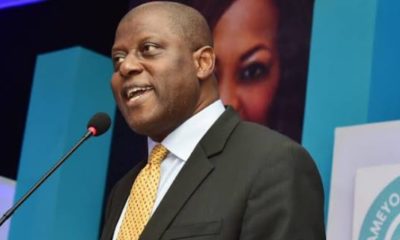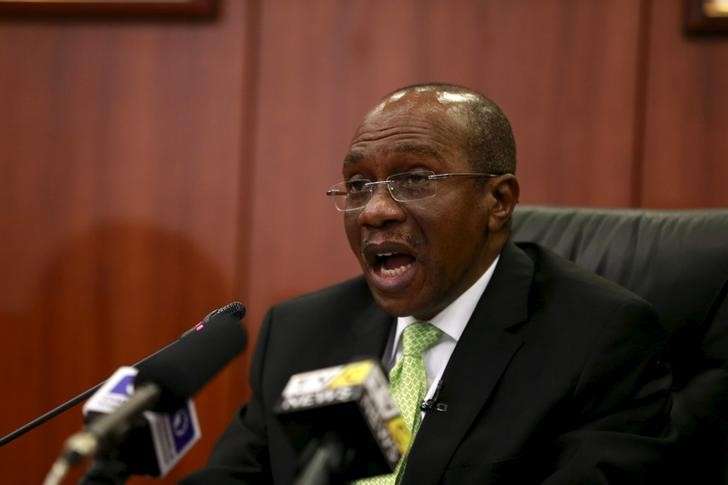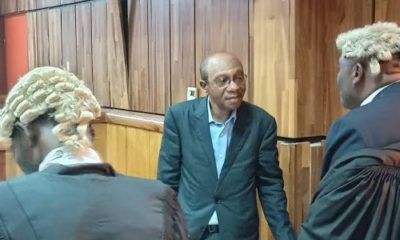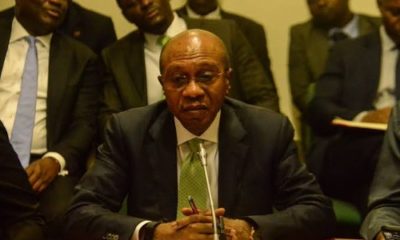Finance
CBN stops sale of forex to BDCs
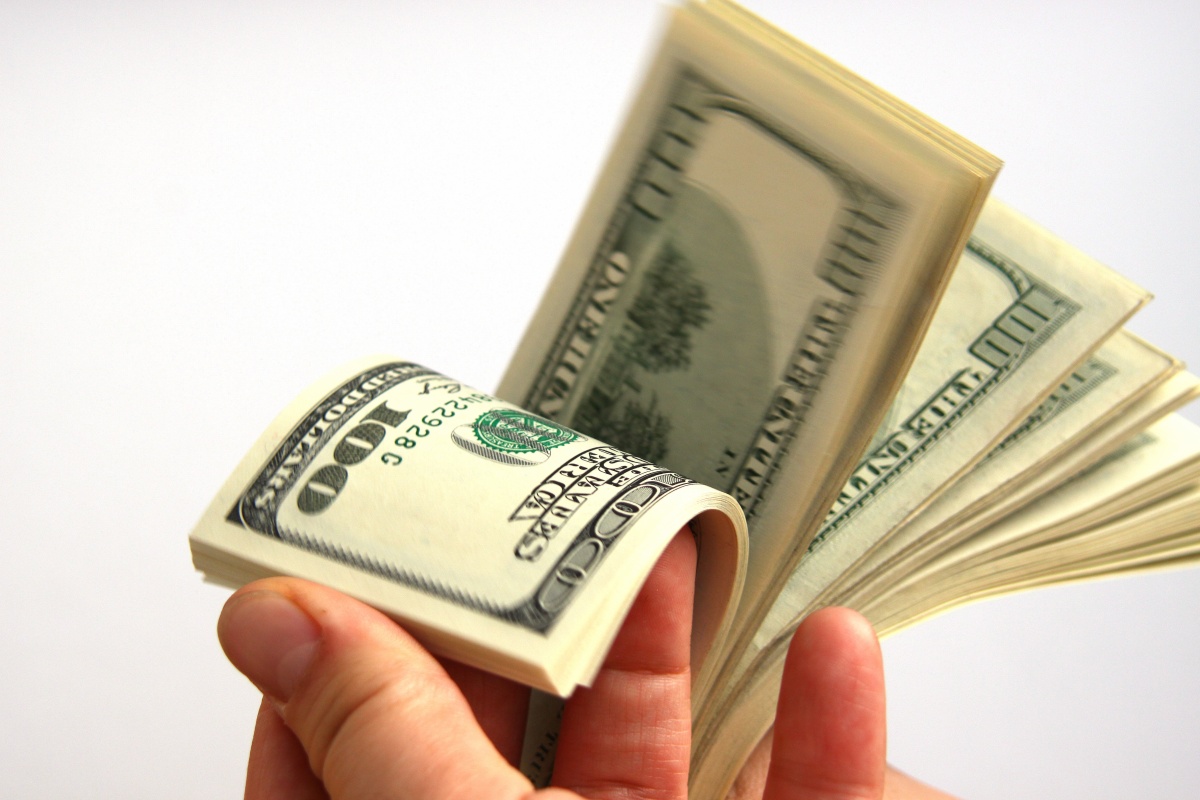
LAGOS — THE Central Bank of Nigeria, CBN, has stopped, with immediate effect, the sale of foreign exchange, forex, to Bureaux de Change, BDCs, as part of measures to reduce the pressure on the nation’s foreign reserves.
The reserves, which closed last year at $28.364 billion, dropped last weekend to $28.193 billion, showing a depletion by $170 million in the first trading week of this year. To date, it had lost about $3.8 billion since mid last year when CBN announced a recovery to $31.8 billion.
As the new policy shift was being announced, yesterday, the national currency, Naira, completely reversed its Christmas gains, hitting a new low value of N283/USD1 in BDCs and the parallel markets. The currency had gained from low business cycle of Yuletide and informal supplies from returning Nigerians, appreciating to N265/$1.0 against N281/$1.0 it recorded in the middle of last month.
The Governor of the CBN, Mr. Godwin Emefiele, who announced the policy change in Abuja, yesterday, said BDCs are now to source forex from the autonomous market.
He also announced that members of the public can now resume transactions on their domiciliary accounts. That means bank customers can now resume depositing of foreign currencies in their accounts with their banks.
Emefiele’s words: “The bank (CBN) would henceforth discontinue its sales of foreign exchange to BDCs. Operators in this segment of the market would now need to source their foreign exchange from autonomous source. They must, however, note that the CBN would deploy more resources to monitoring these sources to ensure that no operator is in violation of our anti-money laundering laws.
“Despite the fact that Nigeria is the only country in the world where the central bank sells dollars directly to BDCs, operators in this segment have not reciprocated the bank’s gesture to help maintain stability in the market. Whereas the bank has continued to sell Dollars at about N197 per dollar to these operators, they have in turned become greedy in their sales to ordinary Nigerians, with selling rates as high as N250 per dollar.
“Given this rent-seeking behaviour, it is not surprising that since the CBN began to sell foreign exchange to BDCs, the number of operators have risen from a mere 74 in 2005 to 2,786 today. In addition, the CBN receives close to 150 new applications for BDC licences every month.
“Rather than help to achieve the laudable objectives for which they were licensed, the bank has noted the following unintended outcomes:
“Avalanche of rent-seeking operators only interested in widening margins and profits from the foreign exchange market, regardless of prevailing official and inter-bank rates;
“Potential financing of unauthorized transactions with foreign exchange procured from the CBN;
“Gradual dollarization of the Nigerian economy with attendant adverse consequences on the conduct of monetary policy and subtle subversion of cashless policy initiative; and prevailing ownership of several BDCs by the same promoters in order to illegally buy foreign currencies multiple times from the CBN.”
He described the insatiable appetite of BDCs for forex as “a huge hemorrhage on our scarce foreign exchange reserves, and cannot continue especially because we are also concerned that BDCs have become a conduit for illicit trade and financial.”
Emefiele said BDCs operators who cannot cope with the new regulation had the option of turning in their licences to collect their N35 million cautionary deposits with the CBN.
On foreign currency deposits
On foreign currency deposits, Emefiele said: “The bank would now permit commercial banks in the country to begin accepting cash deposits of foreign exchange from their customers.”
According to the governor, the policy objectives for banning the foreign currency deposits have been achieved.
He explained that CBN put the policy in place because it discovered that speculators were withdrawing their Naira deposits and using same to buy up foreign currencies and then depositing same in banks and waiting to change the same at higher rates.
His words: “We discovered that Nigeria was fast approaching the dollarization of the economy. At that time we saw that a lot of people were speculating and there were a lot of speculative attacks on the currency (Naira).
“We saw situations where people were going into their accounts, took the Naira out of their accounts to buy dollars. Some were going to their banks to borrow money to buy dollars and then pass those dollars to their accounts and it got to a point that the banks vaults were full and the banks wanted us to collect the cash and to give them electronic dollars which we said we could not do.
“What we had to do at that time, it was like a flood, a torrent that we had to put break to that flood. At this point, we think, let’s open the tap a little and let’s see whether there will be proper behavior by the operators and the people in the market.”
Policy Change and IMF connection
The CBN’s policy was also coming on the heels of criticism of its stringent forex measures by Managing Director of the International Monetary Fund, IMF, Mrs Christine Lagarde, while on official visit to Nigeria last week.
Financial analysts at Afrinvest Group, a Lagos-based investment house said “with the visit of the IMF boss where emphasis was laid on further flexibility in the management of the currency, we believe the apex bank may review its current position on the pricing of the Naira going forward.”
According to them “the IMF’s position on the management of the Naira was not surprising given the pressure on the value of the Naira in the parallel market which has amplified the calls for further devaluation of the Naira.
“The IMF advocated for more flexibility in the management of the local unit in order to stem the rout on the Naira as the capacity of the CBN to defend the Naira wanes (depleting external reserves).
“Thus, we imagine that the CBN may need to review its position on the pricing of the Naira going forward.
“In conclusion, the visit of the IMF Boss seemed timely as we expect this to give policy makers an opportunity to review their stance on critical issues in the economy within the context of global perception as the country makes hard choices in 2016”.
Vanguard-
Business
Nigeria pays US$4.9 billion on petrol subsidy in 2024- NNPCL
It was however noted by Biztellers.com.ng, that although subsidy is back in effect, the main reason for that is the increasingly weak state of the Naira and the country’s extreme dependence on products importation. Also unlike the previous subsidy era, where several oil marketers were getting free subsidy refunds for unverified product importation, this subsidy era is witnessing only one importer, the NNPCL, which in effect is the sole receiver of government subsidies.
Yemie ADEOYE
INSPITE of the official position of the Nigerian government that the controversial petrol subsidy is gone for good as announced by the President on assumption of office, the state owned Nigerian National Petroleum Corporation Limited, NNPCL has disclosed that petrol subsidy is still fully operational in Nigeria, although, under a different identity.
Umar Ajiya, Chief Financial Officer at the NNPCL, disclosed that it cost the company a staggering N7.8 trillion (US$4.9) to cover this price gap in the first seven months of 2024.
Rather than simply referring to these claims as subsidies, he stated that the company is merely managing the price difference in petrol imports on behalf of the federation, stressing that this should not be misconstrued as a return to subsidy payments.
![]() This revelation has reignited discussions on whether the NNPC is indirectly offering subsidies, a concept typically defined as selling a product below its cost price.
This revelation has reignited discussions on whether the NNPC is indirectly offering subsidies, a concept typically defined as selling a product below its cost price.
Documents reviewed by Biztellers.com.ng showed that the term “subsidy” was used extensively in official correspondence between the NNPCL and the presidency, particularly in reference to the “shortfall.”
Recall that President Bola Tinubu reportedly approved NNPC’s request to utilize the 2023 final dividends due to the federation to offset these costs.
However, during a media briefing on Monday about the company’s 2023 audited financial statements, Ajiya refuted claims that the NNPC is involved in any subsidy scheme.
Ajiya further disclosed that the Nigerian government owes the NNPC N7.8 trillion ($4.9 billion) in subsidy-related debts for the period from January to July 2024.
In furtherance of his clarification to the News Agency of Nigeria (NAN), Ajiya insisted that no subsidy payments have been made to any marketer in the last nine years, citing the NNPC’s role as the sole importer of petrol under supply contracts.
He said, “In the last eight to nine years, NNPC Ltd. has not paid anyone a dime as a subsidy; no kobo has been disbursed by NNPC Ltd. in the name of subsidy. No marketer has received any payment from us for subsidy.”
“What has been happening is that we have been importing PMS, which has been landing at a specific cost price, and the government tells us to sell it at half price. So the difference between the landing price and that half price is a shortfall.
“And the deal is between the Federation and NNPC Ltd., to reconcile, sometimes they give us money, so there is no money exchanging hands with any marketer in the name of subsidy.”
Ajiya remained silent on how much of the $4.9 billion could have been remitted to the federation account if the NNPC had not been covering the “shortfall.”
It was however noted by Biztellers.com.ng, that although subsidy is back in effect, the main reason for that is the increasingly weak state of the Naira and the country’s extreme dependence on products importation. Also unlike the previous subsidy era, where several oil marketers were getting free subsidy refunds for unverified product importation, this subsidy era is witnessing only one importer, the NNPCL, which in effect is the sole receiver of government subsidies.
Banking
CBN Denies Currency Devaluation

The Central Bank of Nigeria (CBN) has refuted claims of devaluing the.
Earlier reports suggested that the CBN had devalued the Naira, lowering its exchange rate from N631 to the dollar, compared to the previous day’s rate of N461.60 at the Importers and Exporters (I&E) window.
However, the Central Bank of Nigeria (CBN) released a statement on Thursday through its Acting Head of Corporate Communications, Dr. Isa Abdulmumin, categorizing the report as false information.
In the statement titled ‘CBN Has Not Devalued The Naira’, he said the attention of the apex bank was drawn to the news report by an Abuja based newspaper edition of June 1, 2023, titled “CB Devalues Naira To 630/51”.
However, the CBN stated categorically that the news report was replete with outright FALSEHOODS and destabilizing innuendos, ‘reflecting potentially willful ignorance of the said medium as to the workings of the Nigerian Foreign Exchange Market.’
“For the avoidance of doubt, the exchange rate at the Investors’ & Exporters (I&E) window traded this morning (June 1, 2023) at N465/USS1 and has been stable around this rate for a while.
“The public is hereby advised to ignore the news report by Daily Trust in its entirety, as it is speculative and calculated at causing panic in the market,” the CBN spokesman added.
He, therefore, advised media practitioners to verify their facts from the Central Bank of Nigeria before publishing in order not to misinform the public.
Banking
BREAKING: CBN Increases Interest Rate By 0.5%

The interest rate in Nigeria has been raised to 18.5 percent, up by 0.5 percent, from 18 percent where it was pegged in March 2023.
The Central Banks of Nigeria’s (CBN) Monetary Policy Committee (MPC) resolved to this effect at its third meeting of 2023 in Abuja, on Wednesday.
Governor, CBN, Godwin Emefiele, made the disclosure in the communiqué of the MPC’s meeting, thereafter.
While engaging the media at the end of the two-day meeting, Emefiele, said the committee voted to keep the asymmetric corridor at +100 and -700 basis points around the MPR.
In the view of the MPC, rising inflation rate is traceable to the high energy cost and challenges around the supply chain, among others, which lie outside the corridors of the CBN.
Emefiele said, “The current trend in price development would continue to be monitored by the bank with greater collaboration with fiscal authority to address the drivers of inflation.”
Biztellers reports that the CBN had effected six consecutive interest rate increases, which has seen the rate move from 11.5 percent in March 2022 to 18.5 percent in May 2023.


